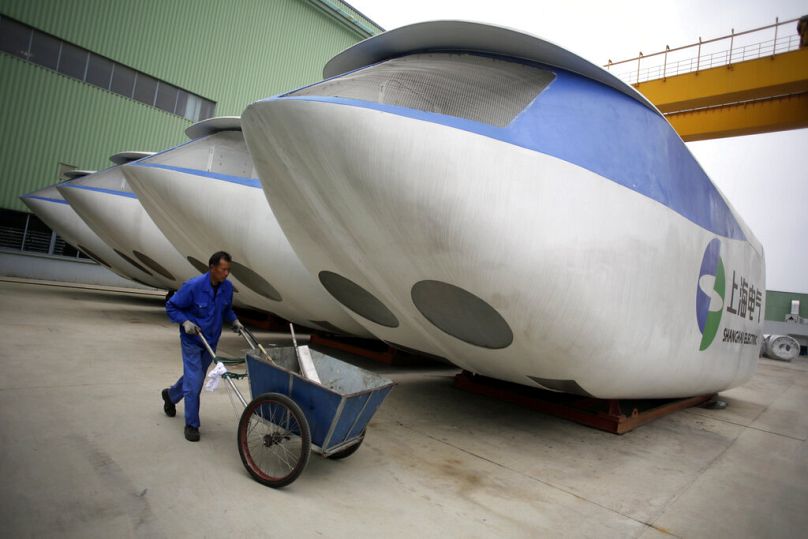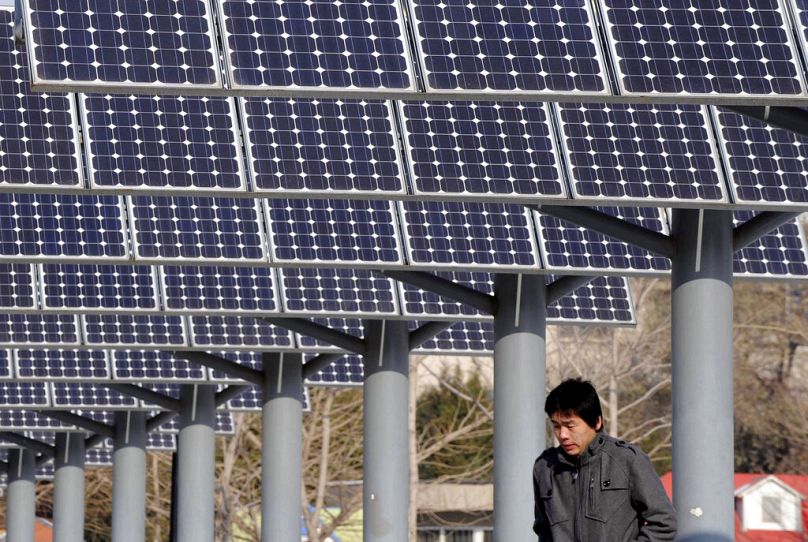For the climate, a fossil backup is not an option. Nor is leaving Europe’s green transition in the hands of Beijing, Janka Oertel and Jonas Parello-Plesner write.
“I name you Laura Maersk!” On a sunny September day in Copenhagen last year, European Commission President Ursula von der Leyen, baptised the brand-new green methanol-fueled ship of Danish logistics superpower Mærsk.
 ADVERTISEMENT
ADVERTISEMENT
 ADVERTISEMENT
ADVERTISEMENT
Some 24 of these boats have already been ordered by Mærsk alone, a small revolution by the European and global champion that has 730 ships ploughing the oceans and is ambitiously moving towards its own 2040 goal of carbon neutrality.
Green methanol is produced from biomass or captured carbon with renewable energy, making it a climate-friendly alternative to traditional fuel. A technical solution to a massive climate problem as shipping makes up almost 3% of global emissions, and a European company is in the lead. It sounds almost too good to be true.
And indeed, there is a snag: China.
The EU’s green ambitions clash with the simultaneous desire to de-risk from China. The aim is to avoid over-reliance on one supplier as previously with Russian gas, which proved a European strategic liability as Russia’s full-scale invasion of Ukraine drove home – even to reluctant German policymakers.
Putting all your eggs in one autocrat’s basket is not only naïve but also just bad economic policy. However, Europe risks making the same mistake again by supplanting its hydrocarbon reliance on Russia with a green dependency on China.
Enormous pressure from Chinese competitors
In solar power, the dominance of Chinese companies is already almost total, in the wind industry, six of the top ten global companies are now from China, and the European battery and electric vehicle industry is under enormous pressure from Chinese competitors.
For the Chinese leadership, green technologies are the vehicle to leapfrog to industrial leadership and dominate the international supply chains of the future. Green fuel for shipping is no exception.
Laura Mærsk’s maiden voyage was supplied by a Dutch provider of low-carbon methanol. There are investments in production in Spain and pilot projects between Denmark and the US on green transport corridors to developing countries.
The company European Energy is also ramping up its production of the green fuel in Denmark and might be able to produce up to 300,000 tonnes of green methanol annually, plans to build big in Estonia’s Pärnu are also gearing up for production in 2028 – the potential is clearly there.
In 2030, Mærsk estimates that it alone will gobble up 6 million tonnes of methanol annually. By 2027 just 4.3 million tonnes are planned to be produced in Europe, almost 10 million tonnes in China.
While China has been known to under-promise and over-deliver on green tech ambition in Europe the opposite has often been true – delays and changing regulatory priorities have kept Europe from relentlessly pursuing competitiveness in a green future.
Quickly de-risking from climate means re-risking economically
In November last year, Mærsk announced in a press release headline that the company was “de-risking” its “low-carbon-emission operations”. Hiding in the smaller print of the press release was the solution.
Bringing in the Chinese wind energy giant Goldwind on board, who will deliver 500,000 tons annually from 2026 with production facilities in Northeast China.
And quickly de-risking from climate change turns into re-risking economically. This process is something that the Chinese leadership actively tries to encourage, dependencies of Western companies on Chinese goods or the Chinese market have often helped smooth the edges of regulatory efforts to curb Chinese dominance and are increasing Chinese political leverage.
Green methanol is just an example of a dynamic that is unfolding across the entirety of the green technology supply chain: Chinese companies produce high quality at extraordinary scale and aggressive price policies.
These prices are often brought about through subsidies and preferential home market conditions, which ridicule the idea of a ‘level playing field’ in which market conditions bring down consumer prices.
So far it has been the Communist Party and not the market that has brought down the prices for green tech. Europe will pay a political premium for its full embrace of this offer.
Europe has woken up to the China challenge
The level of ambition and political will necessary to compete with China over leadership in green technologies will be unprecedented for von der Leyen’s next term and the de-risking agenda. It will have to happen at a time of massive security challenges and fiscal constraints.
Europe has woken up to the China challenge, but it still lags in grasping the scale of the problem and the speed with which it is approaching.
Maersk will need millions of tonnes of green methanol per year to contribute to decarbonising supply chains.
The company is ready to invest in the transition, but it also understands and hedges risk: the 24 new methanol vessels ordered are dual-fuel ships, which can run on both diesel and methanol.
Just in case the tide is shifting.
For the company that may be a sensible strategy, for the climate, a fossil backup is not an option. Nor is leaving Europe’s green transition in the hands of Beijing.
Janka Oertel is the director of the Asia programme at the European Council on Foreign Relations (ECFR), and Jonas Parello-Plesner is the executive director at Alliance of Democracies Foundation.
At Euronews, we believe all views matter. Contact us at view@euronews.com to send pitches or submissions and be part of the conversation.












